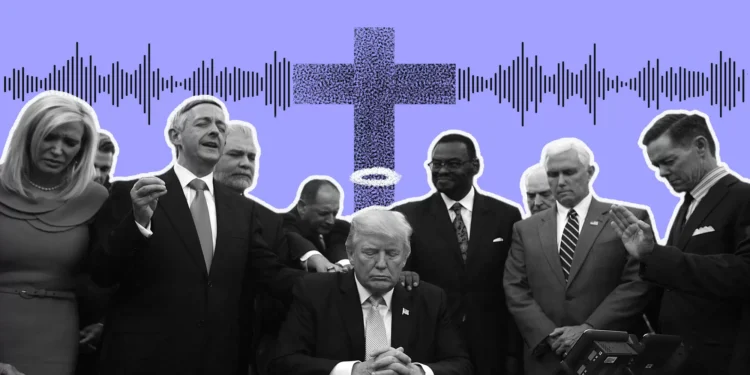Talia Lavin, a renowned journalist and author of “Wild Faith,” has been closely observing the rise of right-wing Christian ideology in American politics. In her latest book, she delves deep into the influence of this ideology and the characters who are guiding President Trump’s vision for America. In an exclusive interview with The Intercept, Lavin shares her insights on the dangerous combination of religion and politics and its impact on the country.
The current political climate in America is heavily influenced by right-wing Christian ideology. From the appointment of conservative judges to the implementation of policies that align with Christian beliefs, the influence of this ideology is evident. But what exactly is this ideology and who are the people behind it?
According to Lavin, the ideology is rooted in the belief that America is a Christian nation and should be governed by biblical principles. This belief is held by a significant portion of Trump’s base, who see him as a savior sent by God to protect their values and beliefs. This has led to a dangerous cult-like following, with some even proclaiming that Trump is the chosen one, appointed by God to lead the country.
In her book, Lavin highlights the role of influential figures like Franklin Graham, Jerry Falwell Jr., and Paula White, who have been instrumental in shaping Trump’s policies and garnering support from the Christian community. These leaders have a strong hold on their followers and have been able to use their influence to further their own agendas.
One of the most alarming aspects of this ideology, as pointed out by Lavin, is the demonization of the “other.” This includes anyone who does not align with their beliefs, whether it be immigrants, the LGBTQ+ community, or even other Christians who do not share their extreme views. This has led to a rise in hate crimes and discrimination against marginalized groups.
The Trump administration’s policies, such as the travel ban and the separation of families at the border, are a direct result of this ideology. Lavin argues that these policies are not only inhumane but also go against the very principles of Christianity, which preaches love and acceptance.
Moreover, the influence of this ideology is not limited to domestic policies. It has also played a significant role in shaping Trump’s foreign policy, particularly in regards to Israel. The decision to move the U.S. embassy to Jerusalem was heavily influenced by the Christian Zionist movement, which believes in the restoration of Israel as a biblical prophecy. This has further fueled tensions in the Middle East and jeopardized the prospects of peace in the region.
Lavin also sheds light on the dangerous alliance between the Christian right and the Republican Party. This marriage of convenience has allowed the Christian right to push their agenda and gain political power, while the Republican Party benefits from their support and votes. This has resulted in a disregard for the separation of church and state, a fundamental principle of American democracy.
In light of these developments, Lavin believes it is crucial for Americans to be aware of the influence of right-wing Christian ideology and its impact on the country. She urges people to question and challenge these beliefs, rather than blindly following them.
As for Trump’s vision for America, Lavin argues that it is not a vision for a diverse and inclusive society, but rather a vision of power and control for a select few. The use of religion as a tool to manipulate and divide only serves to further the agenda of those in power.
In conclusion, Lavin’s insights on the dangerous combination of right-wing Christian ideology and politics are eye-opening and thought-provoking. It is essential for Americans to recognize and address this influence in order to protect the values of democracy and equality that our country was founded upon. As Lavin aptly puts it, “We must not allow our nation to be held hostage by those who claim to speak for God.”






